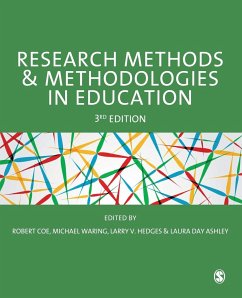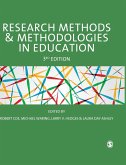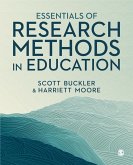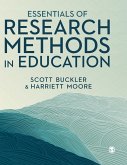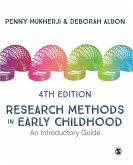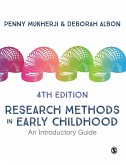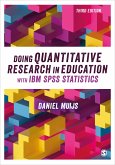Research Methods and Methodologies in Education
Herausgegeben:Coe, Robert; Waring, Michael; Hedges, Larry V.; Day Ashley, Laura
26,99 €
inkl. MwSt.
Versandfertig in 6-10 Tagen

13 °P sammeln
Research Methods and Methodologies in Education
Herausgegeben:Coe, Robert; Waring, Michael; Hedges, Larry V.; Day Ashley, Laura
- Broschiertes Buch
- Merkliste
- Auf die Merkliste
- Bewerten Bewerten
- Teilen
- Produkt teilen
- Produkterinnerung
- Produkterinnerung
Your #1 resource for carrying out educational research as part of postgraduate study.
High-quality educational research requires careful consideration of every aspect of the process. This all-encompassing textbook written by leading international experts gives you considered overview of principles that underpin research, and key qualitative, quantitative and mixed methods for research design, data collection and analysis.
This third edition includes four new chapters: Disseminating your research Data science and computational research methods Observational methods Analysis of variance…mehr
Andere Kunden interessierten sich auch für
![Research Methods and Methodologies in Education Research Methods and Methodologies in Education]() Research Methods and Methodologies in Education88,99 €
Research Methods and Methodologies in Education88,99 €![Essentials of Research Methods in Education Essentials of Research Methods in Education]() Scott BucklerEssentials of Research Methods in Education25,99 €
Scott BucklerEssentials of Research Methods in Education25,99 €![Essentials of Research Methods in Education Essentials of Research Methods in Education]() Scott BucklerEssentials of Research Methods in Education78,99 €
Scott BucklerEssentials of Research Methods in Education78,99 €![Research Methods in Early Childhood Research Methods in Early Childhood]() Penny MukherjiResearch Methods in Early Childhood24,99 €
Penny MukherjiResearch Methods in Early Childhood24,99 €![Research Methods in Early Childhood Research Methods in Early Childhood]() Penny MukherjiResearch Methods in Early Childhood75,99 €
Penny MukherjiResearch Methods in Early Childhood75,99 €![Action Research in Education Action Research in Education]() Vivienne Marie BaumfieldAction Research in Education35,99 €
Vivienne Marie BaumfieldAction Research in Education35,99 €![Doing Quantitative Research in Education with IBM SPSS Statistics Doing Quantitative Research in Education with IBM SPSS Statistics]() Daniel MuijsDoing Quantitative Research in Education with IBM SPSS Statistics88,99 €
Daniel MuijsDoing Quantitative Research in Education with IBM SPSS Statistics88,99 €-
-
-
Your #1 resource for carrying out educational research as part of postgraduate study.
High-quality educational research requires careful consideration of every aspect of the process. This all-encompassing textbook written by leading international experts gives you considered overview of principles that underpin research, and key qualitative, quantitative and mixed methods for research design, data collection and analysis.
This third edition includes four new chapters:
Disseminating your research Data science and computational research methods Observational methods Analysis of variance (ANOVA)
Plus a new Research essentials feature that highlights key must-haves or misconceptions relating to each methodological approach, research design or analytical tool discussed.
This is essential reading for postgraduate students on education courses and early career researchers looking to sharpen their research practice.
High-quality educational research requires careful consideration of every aspect of the process. This all-encompassing textbook written by leading international experts gives you considered overview of principles that underpin research, and key qualitative, quantitative and mixed methods for research design, data collection and analysis.
This third edition includes four new chapters:
Disseminating your research Data science and computational research methods Observational methods Analysis of variance (ANOVA)
Plus a new Research essentials feature that highlights key must-haves or misconceptions relating to each methodological approach, research design or analytical tool discussed.
This is essential reading for postgraduate students on education courses and early career researchers looking to sharpen their research practice.
Produktdetails
- Produktdetails
- Verlag: SAGE Publications Ltd / Sage Publications
- 3. Aufl.
- Seitenzahl: 464
- Erscheinungstermin: 21. April 2021
- Englisch
- Abmessung: 235mm x 191mm x 25mm
- Gewicht: 829g
- ISBN-13: 9781529729627
- ISBN-10: 1529729629
- Artikelnr.: 60621164
- Herstellerkennzeichnung
- Libri GmbH
- Europaallee 1
- 36244 Bad Hersfeld
- gpsr@libri.de
- Verlag: SAGE Publications Ltd / Sage Publications
- 3. Aufl.
- Seitenzahl: 464
- Erscheinungstermin: 21. April 2021
- Englisch
- Abmessung: 235mm x 191mm x 25mm
- Gewicht: 829g
- ISBN-13: 9781529729627
- ISBN-10: 1529729629
- Artikelnr.: 60621164
- Herstellerkennzeichnung
- Libri GmbH
- Europaallee 1
- 36244 Bad Hersfeld
- gpsr@libri.de
Robert Coe, Director of Research and Development at Evidence Based Education, Senior Associate at the Education Endowment Foundation and Honorary Professor of Education at Durham University. His research interests focus on the application of research to supporting improvements in educational practice, drawing on experience as a university professor and high school teacher, with particular expertise in evaluation methodology and educational assessment. Dr Michael Waring, Griffith Institute for Educational Research, School of Education and Professional Studies, Griffith University, Australia. He sits on the executive of the Society for Educational Studies, and is on the editorial board of the British Journal of Educational Studies and Higher Education Pedagogies. His research interests focus on the development of inclusive participatory pedagogy, assessment feedback, research literacy and the use of learning technologies as part of distance and blended learning in higher education and initial teacher education contexts. Generally, and as part of the exploration of this personalised learning agenda, he is interested in the use and innovative development of qualitative research methodology. Larry V. Hedges is one of eight Board of Trustees Professors at Northwestern, the university's most distinguished academic position. He holds appointments in statistics and data science, psychology, education and social policy, and medical social sciences. Previously, he was the Stella M. Rowley Distinguished Service Professor at the University of Chicago. He received the Yidan Prize in Education Research in 2018 and the José Vasconcelos World Award of Education from the World Culture Council in 2023 He is an elected member of the National Academy of Education and is a fellow of the American Academy of Arts and Sciences, the American Statistical Association, the American Psychological Association, the Association for Psychological Science, and the American Educational Research Association. He is also a member of the Society for Research on Educational Effectiveness, which established an annual endowed lecture in his honor. He was selected to give the inaugural Hedges Lecture in 2016. Hedges was nominated by President Barack Obama to the Board of Directors of the National Board for Education Sciences, was confirmed by the U.S. Senate in June 2012, and was elected Chair of the Board in 2016. Widely published, he has authored or co-authored 250 journal articles and 13 books including Coe, Waring, Hedges, & Day Ashley, Research Methods and Methodologies in Education, 3rd edition (2021, Sage London). He has also co-directed research training institutes on research design funded by the US Institute of Education Sciences, the National Institutes of Health, and the National Science Foundation for the last 20 years. Dr Laura Day Ashley, University of Birmingham, Lecturer and Co-Head of Research and Knowledge Transfer for the Department of Education and Social Justice. She has a background in social anthropology and comparative and international education, with a particular interest in alternative, informal and non-state forms of education provision beyond, or at the margins of, mainstream state schooling. Her research on private and non-state schools in low and middle-income countries has achieved significant and sustained policy impact. She has particular expertise in case study research in multiple contexts, and the development of rigorous literature reviews that assess bodies of evidence derived from both qualitative and quantitative research.
Chapter 1: Introduction - Robert J. Coe
PART I: INTRODUCTION TO RESEARCH METHODS AND METHODOLOGIES IN EDUCATION
Chapter 2: The nature of educational research - Robert J. Coe
Chapter 3: Finding your theoretical position - Michael Waring
PART II: BASIC PRINCIPLES AND PRACTICE IN CONDUCTING RESEARCH
Chapter 4: Design of empirical research - Larry V. Hedges
Chapter 5: Planning your research - Laura Day Ashley
Chapter 6: Inference and interpretation in research - Robert J. Coe
Chapter 7: Research ethics - Martyn Hammersley
Chapter 8: Disseminating your research - Mike McLinden
PART III: RESEARCH DESIGNS
Chapter 9: Action research - Carol Munn-Giddings
Chapter 10: Naturalistic research - Rob Walker
Chapter 11: Ethnographic research - Ghazala Bhatti
Chapter 12: Visual methodologies - Claudia Mitchell
Chapter 13: Grounded theory - Michael Waring
Chapter 14: Case study research - Laura Day Ashley
Chapter 15: Secondary data - Emma Smith
Chapter 16: Longitudinal research - Anna Vignoles
Chapter 17: Statistical and correlational techniques - Stephen Gorard
Chapter 18: Impact evaluation - Steve Higgins
Chapter 19: Interventions: experiments - Peter Tymms
Chapter 20: Mixing methods in education research - Gert Biesta
Chapter 21: Systematic reviews - Carole Torgerson, Jill Hall, Kate Lewis-Light
Chapter 22: Data science and computational research methods - Christian Bokhove
PART IV: DATA COLLECTION TOOLS
Chapter 23: Observational methods - Drew H. Gitomer
Chapter 24: In-depth interviews - Carolyn L. Mears
Chapter 25: Focus groups and group interviews - Anita Gibbs
Chapter 26: Internet-based methods - Rhona Sharpe and Greg Benfield
Chapter 27: Doing social media research - Eve Stirling
Chapter 28: Documentary methods - Gary McCulloch
Chapter 29: Questionnaires - Peter Tymms
PART V: ANALYSIS METHODS
Chapter 30: Using software in qualitative data analysis - Graham R. Gibbs
Chapter 31: Statistical analysis tools - Paul Connolly
Chapter 32: Discourse analysis - Elaine Vaughan
Chapter 33: Media analysis - Michael Atkinson
Chapter 34: Biographical research - Michael Tedder
Chapter 35: Statistical hypothesis tests - Michael Borenstein
Chapter 36: Analysis of variance (ANOVA) - Wendy Chan
Chapter 37: Multiple linear regression - Stephen Gorard
Chapter 38: Multilevel analysis - Michael Seltzer and Jordan Rickles
Chapter 39: Effect sizes - Robert J. Coe
Chapter 40: Meta-analysis - Larry V. Hedges
PART I: INTRODUCTION TO RESEARCH METHODS AND METHODOLOGIES IN EDUCATION
Chapter 2: The nature of educational research - Robert J. Coe
Chapter 3: Finding your theoretical position - Michael Waring
PART II: BASIC PRINCIPLES AND PRACTICE IN CONDUCTING RESEARCH
Chapter 4: Design of empirical research - Larry V. Hedges
Chapter 5: Planning your research - Laura Day Ashley
Chapter 6: Inference and interpretation in research - Robert J. Coe
Chapter 7: Research ethics - Martyn Hammersley
Chapter 8: Disseminating your research - Mike McLinden
PART III: RESEARCH DESIGNS
Chapter 9: Action research - Carol Munn-Giddings
Chapter 10: Naturalistic research - Rob Walker
Chapter 11: Ethnographic research - Ghazala Bhatti
Chapter 12: Visual methodologies - Claudia Mitchell
Chapter 13: Grounded theory - Michael Waring
Chapter 14: Case study research - Laura Day Ashley
Chapter 15: Secondary data - Emma Smith
Chapter 16: Longitudinal research - Anna Vignoles
Chapter 17: Statistical and correlational techniques - Stephen Gorard
Chapter 18: Impact evaluation - Steve Higgins
Chapter 19: Interventions: experiments - Peter Tymms
Chapter 20: Mixing methods in education research - Gert Biesta
Chapter 21: Systematic reviews - Carole Torgerson, Jill Hall, Kate Lewis-Light
Chapter 22: Data science and computational research methods - Christian Bokhove
PART IV: DATA COLLECTION TOOLS
Chapter 23: Observational methods - Drew H. Gitomer
Chapter 24: In-depth interviews - Carolyn L. Mears
Chapter 25: Focus groups and group interviews - Anita Gibbs
Chapter 26: Internet-based methods - Rhona Sharpe and Greg Benfield
Chapter 27: Doing social media research - Eve Stirling
Chapter 28: Documentary methods - Gary McCulloch
Chapter 29: Questionnaires - Peter Tymms
PART V: ANALYSIS METHODS
Chapter 30: Using software in qualitative data analysis - Graham R. Gibbs
Chapter 31: Statistical analysis tools - Paul Connolly
Chapter 32: Discourse analysis - Elaine Vaughan
Chapter 33: Media analysis - Michael Atkinson
Chapter 34: Biographical research - Michael Tedder
Chapter 35: Statistical hypothesis tests - Michael Borenstein
Chapter 36: Analysis of variance (ANOVA) - Wendy Chan
Chapter 37: Multiple linear regression - Stephen Gorard
Chapter 38: Multilevel analysis - Michael Seltzer and Jordan Rickles
Chapter 39: Effect sizes - Robert J. Coe
Chapter 40: Meta-analysis - Larry V. Hedges
Chapter 1: Introduction - Robert J. Coe
PART I: INTRODUCTION TO RESEARCH METHODS AND METHODOLOGIES IN EDUCATION
Chapter 2: The nature of educational research - Robert J. Coe
Chapter 3: Finding your theoretical position - Michael Waring
PART II: BASIC PRINCIPLES AND PRACTICE IN CONDUCTING RESEARCH
Chapter 4: Design of empirical research - Larry V. Hedges
Chapter 5: Planning your research - Laura Day Ashley
Chapter 6: Inference and interpretation in research - Robert J. Coe
Chapter 7: Research ethics - Martyn Hammersley
Chapter 8: Disseminating your research - Mike McLinden
PART III: RESEARCH DESIGNS
Chapter 9: Action research - Carol Munn-Giddings
Chapter 10: Naturalistic research - Rob Walker
Chapter 11: Ethnographic research - Ghazala Bhatti
Chapter 12: Visual methodologies - Claudia Mitchell
Chapter 13: Grounded theory - Michael Waring
Chapter 14: Case study research - Laura Day Ashley
Chapter 15: Secondary data - Emma Smith
Chapter 16: Longitudinal research - Anna Vignoles
Chapter 17: Statistical and correlational techniques - Stephen Gorard
Chapter 18: Impact evaluation - Steve Higgins
Chapter 19: Interventions: experiments - Peter Tymms
Chapter 20: Mixing methods in education research - Gert Biesta
Chapter 21: Systematic reviews - Carole Torgerson, Jill Hall, Kate Lewis-Light
Chapter 22: Data science and computational research methods - Christian Bokhove
PART IV: DATA COLLECTION TOOLS
Chapter 23: Observational methods - Drew H. Gitomer
Chapter 24: In-depth interviews - Carolyn L. Mears
Chapter 25: Focus groups and group interviews - Anita Gibbs
Chapter 26: Internet-based methods - Rhona Sharpe and Greg Benfield
Chapter 27: Doing social media research - Eve Stirling
Chapter 28: Documentary methods - Gary McCulloch
Chapter 29: Questionnaires - Peter Tymms
PART V: ANALYSIS METHODS
Chapter 30: Using software in qualitative data analysis - Graham R. Gibbs
Chapter 31: Statistical analysis tools - Paul Connolly
Chapter 32: Discourse analysis - Elaine Vaughan
Chapter 33: Media analysis - Michael Atkinson
Chapter 34: Biographical research - Michael Tedder
Chapter 35: Statistical hypothesis tests - Michael Borenstein
Chapter 36: Analysis of variance (ANOVA) - Wendy Chan
Chapter 37: Multiple linear regression - Stephen Gorard
Chapter 38: Multilevel analysis - Michael Seltzer and Jordan Rickles
Chapter 39: Effect sizes - Robert J. Coe
Chapter 40: Meta-analysis - Larry V. Hedges
PART I: INTRODUCTION TO RESEARCH METHODS AND METHODOLOGIES IN EDUCATION
Chapter 2: The nature of educational research - Robert J. Coe
Chapter 3: Finding your theoretical position - Michael Waring
PART II: BASIC PRINCIPLES AND PRACTICE IN CONDUCTING RESEARCH
Chapter 4: Design of empirical research - Larry V. Hedges
Chapter 5: Planning your research - Laura Day Ashley
Chapter 6: Inference and interpretation in research - Robert J. Coe
Chapter 7: Research ethics - Martyn Hammersley
Chapter 8: Disseminating your research - Mike McLinden
PART III: RESEARCH DESIGNS
Chapter 9: Action research - Carol Munn-Giddings
Chapter 10: Naturalistic research - Rob Walker
Chapter 11: Ethnographic research - Ghazala Bhatti
Chapter 12: Visual methodologies - Claudia Mitchell
Chapter 13: Grounded theory - Michael Waring
Chapter 14: Case study research - Laura Day Ashley
Chapter 15: Secondary data - Emma Smith
Chapter 16: Longitudinal research - Anna Vignoles
Chapter 17: Statistical and correlational techniques - Stephen Gorard
Chapter 18: Impact evaluation - Steve Higgins
Chapter 19: Interventions: experiments - Peter Tymms
Chapter 20: Mixing methods in education research - Gert Biesta
Chapter 21: Systematic reviews - Carole Torgerson, Jill Hall, Kate Lewis-Light
Chapter 22: Data science and computational research methods - Christian Bokhove
PART IV: DATA COLLECTION TOOLS
Chapter 23: Observational methods - Drew H. Gitomer
Chapter 24: In-depth interviews - Carolyn L. Mears
Chapter 25: Focus groups and group interviews - Anita Gibbs
Chapter 26: Internet-based methods - Rhona Sharpe and Greg Benfield
Chapter 27: Doing social media research - Eve Stirling
Chapter 28: Documentary methods - Gary McCulloch
Chapter 29: Questionnaires - Peter Tymms
PART V: ANALYSIS METHODS
Chapter 30: Using software in qualitative data analysis - Graham R. Gibbs
Chapter 31: Statistical analysis tools - Paul Connolly
Chapter 32: Discourse analysis - Elaine Vaughan
Chapter 33: Media analysis - Michael Atkinson
Chapter 34: Biographical research - Michael Tedder
Chapter 35: Statistical hypothesis tests - Michael Borenstein
Chapter 36: Analysis of variance (ANOVA) - Wendy Chan
Chapter 37: Multiple linear regression - Stephen Gorard
Chapter 38: Multilevel analysis - Michael Seltzer and Jordan Rickles
Chapter 39: Effect sizes - Robert J. Coe
Chapter 40: Meta-analysis - Larry V. Hedges
